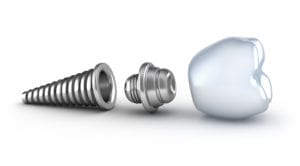 The daily care and maintenance of dental implants is very similar to the care of your natural teeth. Just as with your own natural teeth, it is important to maintain the health of your gums and the implant-supporting jaw bone tissue. Nesconset Dental Associates, in Nesconset, NY, wants you to be informed about the best way to care for your dental implants. If implants are properly cared for, they can last a lifetime.
The daily care and maintenance of dental implants is very similar to the care of your natural teeth. Just as with your own natural teeth, it is important to maintain the health of your gums and the implant-supporting jaw bone tissue. Nesconset Dental Associates, in Nesconset, NY, wants you to be informed about the best way to care for your dental implants. If implants are properly cared for, they can last a lifetime.
Can Dental Implants Get Infected?
Because dental implants are artificial with a titanium screw as a root and a ceramic crown, it is impossible for the implant itself to develop tooth decay and develop a cavity or for the “tooth” to become infected. However, the lifespan of the dental implant can be in danger when the gum and jawbone tissue around the implant becomes inflamed due to infection, a condition known as implantitis.
When the gums become inflamed, dental implants can become covered in sticky, bacteria-infested plaque. These bacteria are the same destructive organisms that cause periodontal infections in natural teeth. Plaque, a substance formed by saliva and leftover food particles in the mouth, if not removed by brushing, flossing and routine professional cleaning, can become dental calculus. Calculus forms when plaque hardens into hard deposits that can eat away at the supporting gum and bone that surround the implant and hold it in place in the jaw.
Once calculus has formed, the deposits cannot be brushed or flossed off and can only be removed by a dental hygienist. Failure to do this can lead to receding gum tissue and bone loss and may result in the implant falling out.
How To Keep Dental Implants Healthy
To avoid the formation of calculus and your gums becoming irritated and inflamed, your dental implants should be brushed at least twice a day and flossed at least daily as is recommended for your natural teeth by your Nesconset Dental Associates dentist and the American Dental Association.
Performing regular oral hygiene after meals is especially important to remove trapped food particles from between teeth that can lead to tooth decay. You should brush with an ADA-approved toothbrush to ensure you are not damaging the implant or your surrounding teeth or gums.
Nesconset Dental Associates advises using the following:
- Small, soft, ADA-approved manual toothbrush or an electric brush
- Low-abrasive, tartar-control toothpaste
- Dental floss for cleaning around the implant
- Antimicrobial mouth rinses
Not only should you perform dental hygiene at home daily, but be sure to schedule regular visits to Nesconset Dental Associates or your area dentist. It is recommended that you have a professional exam and cleaning every 3-6 months. You should also have your dental implants examined by x-ray annually.
What Happens If I Don’t Take Care Of My Implants?
Implants can develop serious issues without conscientious daily care. Bleeding from the implant site — known as mucositis — is usually the first sign of a problem. The current research indicates that mucositis may be successfully treated and reversed if spotted and addressed early enough. Unfortunately, if the condition worsens to the point that bone loss has occurred, also known as peri-implantitis, it is not reversible without major dental procedures. If peri-implantitis is allowed to go untreated it can lead to advanced bone loss and the implant may become loose or even fall out.
What Should My Dentist Check For At Every Cleaning?
Your Nesconset Dental Associates hygienist will need to probe and measure the gums around the implant the same as they do around your teeth, checking and compare x-rays annually, looking for looseness, and checking the bite and that all of the components are attached properly to the implant and are functioning properly.
What If I Want Implants Or Need My Implants Checked?
If you are located in the Nesconset, NY area and think you would benefit from implants due to missing or broken teeth or need the implants you already have inspected, Nesconset Dental Associates are ready to help. Please call us at (631) 228-8780 or schedule a consultation online today!
